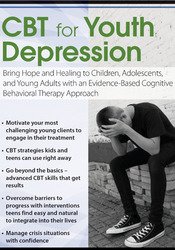

When depressed young people come to your office it’s often not by choice. Worried parents, unsure if this is just a phase or something more, come to you with kids who feel they’ve been brought against their will. They are frequently angry, alienated, and reject the idea of depression. Fear of treatment related stigma, hopelessness about the future, and distrust can cause clients to withdraw from their therapist, giving you very little to work with and leaving you frustrated and looking for ways to engage them. And even the most seasoned clinician knows the challenges of explaining complicated treatment concepts in a way young people can comfortably understand and willingly incorporate into their lives. It all adds up to a situation in which many depressed youth fail to fully participate in the therapy they so desperately need. And the consequences are real. Left untreated, depressed adolescents are at major risk of engaging in self-harming and suicidal behaviors.
They need your help.
But how do you break down resistance to treatment, build the therapeutic alliance, and instill hope in depressed kids? How do you overcome apathy and lack of motivation to engage them, letting you get down to the crucial work that needs to be done? How do you bring complicated treatment concepts to youth in ways they can easily understand and make them feel normal, in control, and part of the process?
Widely researched, Cognitive Behavioral Therapy (CBT) has been confirmed to be an effective approach for treating depression in adolescents.
Key benefits of watching:
Transform the lives of your depressed young clients with the power of a proven, skills-based CBT approach!
This online program is worth 6.0 hours CPD.
| File type | File name | Number of pages | |
|---|---|---|---|
| Manual (3.86 MB) | 151 Pages | Available after Purchase |

David M. Pratt, PhD, MSW, is a New York State Licensed Psychologist with 40+ years’ experience working with children, adolescents and families. Dr. Pratt is in private practice at the Western New York Psychotherapy Services in Amherst, NY. He is presently on faculty with the University at Buffalo, School of Social Work, Office of Continuing Education and a member of New York State, Office of Mental Health Advisory Board on Evidence-Based Treatments for Youth. He was the Principal Psychologist at the Western New York Children’s Psychiatric Center, Clinical Assistant Professor of Psychiatry at the University at Buffalo and Adjunct Professor/Lecturer, University at Buffalo Counseling, School and Educational Psychology department. Dr. Pratt has conducted numerous trainings in Cognitive Behavioral Therapy at local, state, national and international forums. He is the author of CBT Toolkit for Depressed, Anxious and Suicidal Children and Adolescents (PESI Publishing, Inc., 2019) and Advanced CBT Toolbox for Children and Adolescents: Promoting Resilience, Positive Emotions and Personal Growth (in press, PESI, Publishing, Inc.).
Speaker Disclosures:
Financial: Dr. David Pratt maintains a private practice. He has an employment relationship with the University at Buffalo. He receives a speaking honorarium and recording and book royalties from PESI, Inc. He has no relevant financial relationships with ineligible organizations.
Non-financial: Dr. David Pratt serves on the advisory board for the New York State Office of Mental Health.
Get Client Buy-In: Engagement and Motivational Enhancement Strategies
The CBT Paradigm: Making it Simple to Understand and Use
Advanced CBT Techniques: Mindfulness Based Cognitive Therapy (MBCT) and Acceptance and Commitment Therapy (ACT)
Parent Involvement Strategies: Build a Therapeutic Alliance with Families
How to Handle Crisis Situations: Self-Harm and Suicide Prevention
| 5 |
|
| 4 |
|
| 3 |
|
| 2 |
|
| 1 |
|
Satisfaction Guarantee
Your satisfaction is our goal and our guarantee. Concerns should be addressed to info@pesi.co.uk or call 01235847393.
Please wait ...